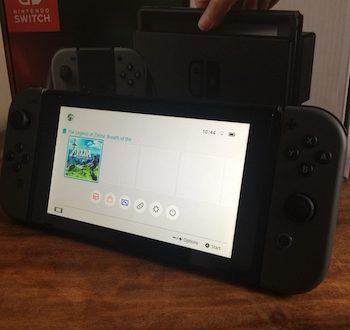That headline isn’t meant to be a sneering "ha-ha, I have a Switch and you don’t" type thing, but literally a somewhat anxious comment on how easy it was for me to get one.
I had been umming and ahhing about taking the plunge on Nintendo’s brand new experimental home/handheld console for the past couple of weeks since online retailer GameSeek announced that it was going to be honouring its promise to sell pre-orders for £198.50, undercutting the RRP by over £80. As we approached the launch day and the site teased further allocation of stock to be released before release and the whole thing turned into one big lottery of being emailed with the chance to buy the console (like getting tickets for Wimbledon), it became increasingly apparent that the chances of me taking advantage of the deal were not in my favour. As expected, I didn’t receive an email and didn’t get one of the cut-price Switches.
This all happened on Wednesday night through to Thursday morning, leaving people still keen on getting the console (at the RRP of £279.99) with little time to rearrange their plans. To say it left consumers in the lurch is one thing, but the constant teasing of the deal and news of said deal on Twitter from the company was an effective way of making sure that they shifted all units out of its warehouse at launch.
So that brings us to today.
Upon waking up just before seven, I rolled over to my phone and, after getting my morning fix of the social media drug that my millenial body depends on, I had a look online to see if the Switch was available. Lo and behold, I see that little tick on Amazon to tell me I can have one tomorrow if I place an order on its Prime service. Then, with curiousity firmly having its hooks in me, I went onto Amazon’s Prime Now app, and yep there it was as well. I placed an order at just after seven, and little more than an hour later a buzz on my door presented a man with a brown paper bag containing my new console.
I remember back in 2013 with the launch of the PlayStation 4 there wasn’t a hope in hell of getting a console on launch without a pre-order. Approaching the day, I had placed a pre-order with an online retailer who said I would be getting the thing roughly six weeks after launch. That was the quickest I could find it so I went with it. But still come launch day and all the hype surrounding Sony’s new console I was eager to get my hands on one. I was living in Canterbury at the time and I went all around town from the High Street to retail estates, from supermarkets to specialist stores; not a PS4 was to be found.
This is what you’d expect from a console launch, not the experience I had this morning.
So what’s the difference? Surely I should be happy that getting the console was so straightforward and that what was previously an arduous slog of pre-meditated purchasing and making doubly sure I wanted it, was turned into a quick process that made buying a game console on launch day an impulse option. Well, I’m not one to look a gift horse in the mouth and I am delighted to actually have a hold of the Switch, but the ease of getting it – in spite of Nintendo’s comments that it was making extra stock available for launch – conciously or unconsciously makes consumers think that it is less in demand.
Obviously the only indicator that we’ll have of how in demand Switch is will come further down the line as sales figures are released. But cast your mind back to the launch of the Wii in 2006, the Wii U in 2012, and, hell, even the NES Classic Edition last year, and you can see products which, while being desirable in their own right, surely became more sought after due to their lack of availability. You look at the Switch’s ease of availabiliy from day one by contrast, and you have to ask whether that sought after factor will come into play.
Underproducing products that you know will be in demand in order to further drive demand is fundamentally anti-consumer. GameSeek played that strategy perfectly with the Switch, and while I wouldn’t go as far as to say it was anti-consumer, driving more people to want to buy the console from the site while only having a finite amount most certainly drove up its sales. In an age where $130 Snapchat Spectacles were being sold by vending machines popping up around the US, and then being resold online for upwards of $500 because of their exclusivity, not being able to get a product right away is par for the course.
This attempt by Nintendo to buck that trend is refreshing and no doubt will inspire some impulse purchases, but for the reasons I’ve mentioned it could backfire. It remains to be seen how successful the Switch will be critically and commercially, but one thing for certain is that if you want to buy the console, you probably won’t have too much trouble finding one for sale.
I bet you’re glad this wasn’t another article about how bad the Switch game cartridges taste, aren’t you?
 PCR Tech and IT retail, distribution and vendor news
PCR Tech and IT retail, distribution and vendor news



